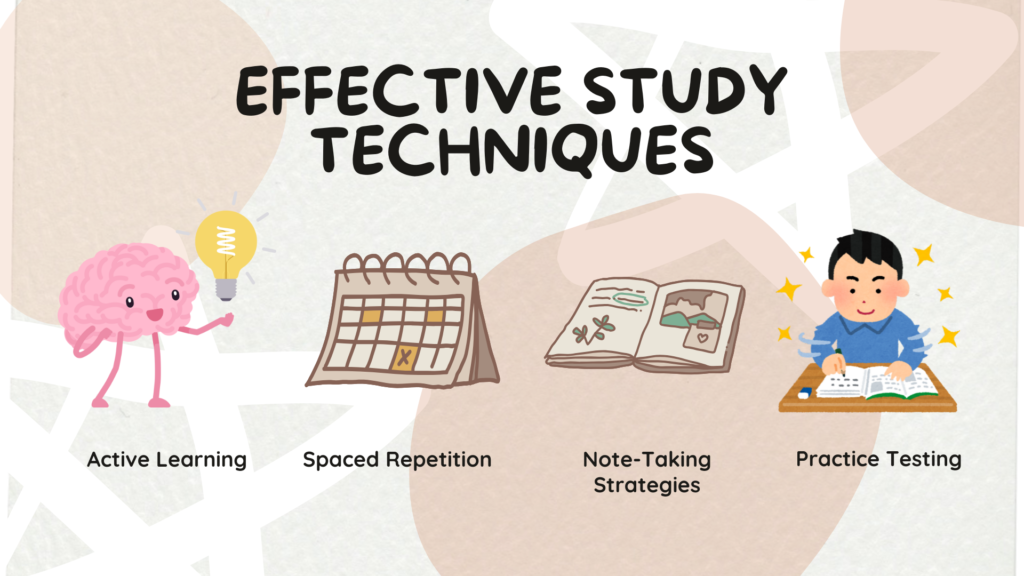Studying for exams can be overwhelming, but using the right techniques can make it much more manageable. Here are practical strategies to help you make the most of your study sessions, improve retention, and perform at your best on exam day. and study effectively for exams.

1. Create a Effective Study Schedule
Academic success is not just about studying hard, but studying smart. Good study habits can reduce stress and improve grades.
- Understanding different learning styles.
- Techniques for effective studying.
- Time management and goal setting.
A well-organized study schedule helps break down topics into manageable parts and ensures you cover everything in time. Start by listing subjects or topics you need to study and prioritize them based on your comfort level and the exam date. Allocate specific time slots each day, and stick to your plan. Remember to schedule regular breaks to prevent burnout.
2. Understanding Learning Style Techniques
Active learning keeps you engaged and enhances understanding. Some techniques include:
Types of Learners:
- Visual Learners: Learn best through images, diagrams, and visual aids.
- Auditory Learners: Retain information better through listening and discussions.
- Kinesthetic Learners: Prefer hands-on activities and movement to learn.
- Reading/Writing Learners: Learn best through reading texts and writing notes.
3. Creating a Study Plan and Utilize Visual Aids
Setting Goal:
- SMART Goals: Specific, Measurable, Achievable, Relevant, Time-bound.
- Break down long-term goals into short-term actionable steps.
Time Management:
- Use a planner or digital calendar to schedule study sessions.
- Allocate time for breaks and relaxation to avoid burnout.
Prioritization:
- Focus on difficult or important subjects first.
- Use the “Eisenhower Matrix” to categorize tasks by urgency and importance.
Visual aids, such as diagrams, charts, and mind maps, make it easier to remember complex information. For example, use a flowchart to outline steps in a process or a diagram to understand relationships between concepts. Visuals can help you recall details more effectively during exams.
4. Effective Study Technique

5. Creating a Conducive Study Environment
Choosing the Right Space:
- Find a quiet, comfortable, and well-lit area for studying.
- Minimize distractions by turning off notifications and keeping the workspace organized.
Tools and Resources:
- Gather all necessary materials (books, notes, stationery) before starting.
- Use apps and online resources to supplement learning.
Study Routine:
- Establish a consistent study schedule to build a habit.
- Include regular breaks (e.g., 5 minutes every 25 minutes using the Pomodoro Technique)
6. Managing Stress and Stay Motivated
Stress Management Techniques:
- Practice mindfulness and breathing exercises to reduce anxiety.
- Stay physically active and maintain a balanced diet to keep energy levels up.
Staying Motivated:
- Set rewards for completing study goals (e.g., a treat or a short break).
- Surround yourself with positive influences, like study groups or mentors.
- Track progress and celebrate small wins to stay encouraged.
7. Avoid Common Pitfalls
Procrastination:
- Break tasks into smaller, manageable chunks.
- Use time-blocking techniques to commit to study times
Cramming:
- Avoid last-minute studying by planning ahead.
- Prioritize understanding over memorization.
Multitasking:
- Focus on one subject at a time to improve concentration and retention.
8. Use a Variety Learning Technology
Study Apps and Tools:
- Use different source for organizing and reviewing material.
- Leverage online courses and videos for additional learning.
Online Study Groups:
- Join online forums, discussion groups, or study communities for collaboration and support.
Digital Note-Taking:
- Consider digital tools (e.g., Notion, OneNote) for organizing notes and study materials.
9. Stay Physically Active and Eat Well
A healthy body supports a sharp mind. Physical activity helps reduce stress, boosts memory, and improves focus. Aim for a balanced diet and stay hydrated. Avoid excessive caffeine, as it may increase anxiety. Restful sleep is equally essential to consolidate learning and keep you alert.
10. Review and Reflect
After each study session, reflect on what you’ve learned. Revisit challenging concepts and refine your understanding. Regular reflection reinforces learning and builds confidence. End your day by reviewing main points from each topic studied, as this reinforces memory retention.
Effective exam preparation combines planning, consistency, and smart study techniques. By following these tips, you’ll be able to approach your exams with confidence and ease. Remember that everyone has a unique study style, so adapt these strategies to suit your personal preferences for the best results.
Recap of Key Points:
- Understand your learning style and tailor your methods accordingly.
- Plan and manage your time effectively.
- Use active learning and spaced repetition to reinforce knowledge.
- Consistency is key—study regularly and avoid cramming.
- Stay organized, manage stress, and keep a positive mindset.